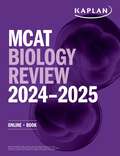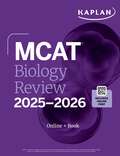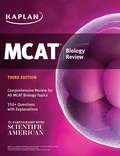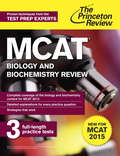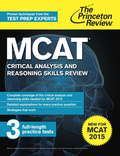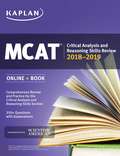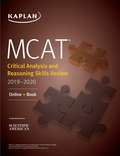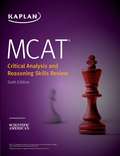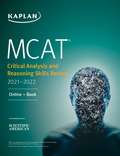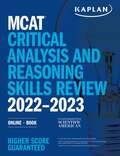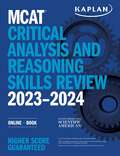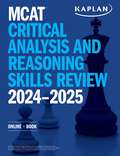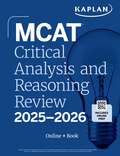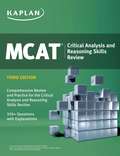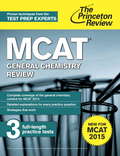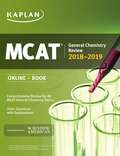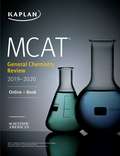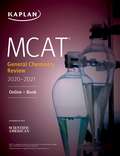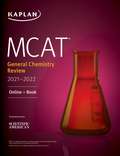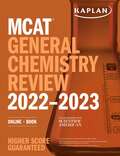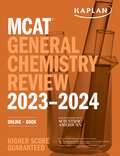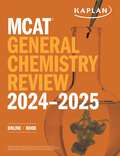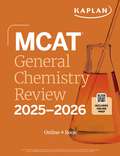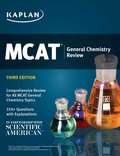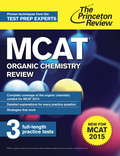- Table View
- List View
MCAT Biology Review 2024-2025: Online + Book (Kaplan Test Prep)
by Kaplan Test PrepKaplan&’s MCAT Biology Review 2024-2025 offers an expert study plan, detailed subject review, and hundreds of online and in-book practice questions—all authored by the experts behind the MCAT prep course that has helped more people get into medical school than all other major courses combined.Prepping for the MCAT is a true challenge. Kaplan can be your partner along the way—offering guidance on where to focus your efforts and how to organize your review. This book has been updated to match the AAMC&’s guidelines precisely—no more worrying about whether your MCAT review is comprehensive!The Most PracticeMore than 350 questions in the book and access to even more online—more practice than any other MCAT biology book on the market.The Best PracticeComprehensive biology subject review is written by top-rated, award-winning Kaplan instructors.Full-color, 3-D illustrations, charts, graphs and diagrams help turn even the most complex science into easy-to-visualize concepts.All material is vetted by editors with advanced science degrees and by a medical doctor.Online resources, including a full-length practice test, help you practice in the same computer-based format you&’ll see on Test Day.Expert GuidanceHigh-yield badges throughout the book identify the topics most frequently tested by the AAMC.We know the test: The Kaplan MCAT team has spent years studying every MCAT-related document available. Kaplan&’s expert psychometricians ensure our practice questions and study materials are true to the test.
MCAT Biology Review 2025-2026: Online + Book (Kaplan Test Prep)
by Kaplan Test PrepKaplan&’s MCAT Biology Review 2024-2025 offers an expert study plan, detailed subject review, and hundreds of online and in-book practice questions—all authored by the experts behind the MCAT prep course that has helped more people get into medical school than all other major courses combined.Prepping for the MCAT is a true challenge. Kaplan can be your partner along the way—offering guidance on where to focus your efforts and how to organize your review. This book has been updated to match the AAMC&’s guidelines precisely—no more worrying about whether your MCAT review is comprehensive!The Most PracticeMore than 350 questions in the book and access to even more online—more practice than any other MCAT biology book on the market.The Best PracticeComprehensive biology subject review is written by top-rated, award-winning Kaplan instructors.Full-color, 3-D illustrations, charts, graphs and diagrams help turn even the most complex science into easy-to-visualize concepts.All material is vetted by editors with advanced science degrees and by a medical doctor.Online resources, including a full-length practice test, help you practice in the same computer-based format you&’ll see on Test Day.Expert GuidanceHigh-yield badges throughout the book identify the topics most frequently tested by the AAMC.We know the test: The Kaplan MCAT team has spent years studying every MCAT-related document available. Kaplan&’s expert psychometricians ensure our practice questions and study materials are true to the test.
MCAT Biology Review: Online + Book
by KaplanMore people get into medical school with a Kaplan MCAT course than all major courses combined. Now the same results are available with MCAT Biology Review. This book features thorough subject review, more questions than any competitor, and the highest-yield questions available. The commentary and instruction come directly from Kaplan MCAT experts and include targeted focus on the most-tested concepts.MCAT Biology Review offers:UNPARALLELED MCAT KNOWLEDGE: The Kaplan MCAT team has spent years studying every MCAT-related document available. In conjunction with our expert psychometricians, the Kaplan team is able to ensure the accuracy and realism of our practice materials.THOROUGH SUBJECT REVIEW: Written by top-rated, award-winning Kaplan instructors, all material has been vetted by editors with advanced science degrees and by a medical doctor.EXPANDED CONTENT THROUGHOUT: As the MCAT has continued to develop, this book has been updated continuously to match the AAMC's guidelines precisely--no more worrying if your prep is comprehensive!"STAR RATINGS" FOR EVERY SUBJECT: New for the 3rd Edition of MCAT Biology Review, every topic in every chapter is assigned a "star rating"--informed by Kaplan's decades of MCAT experience and facts straight from the testmaker--of how important it will be to your score on the real exam.MORE PRACTICE THAN THE COMPETITION: With 350+ questions throughout the book and access to a full-length practice test, MCAT Biology Review has more practice than any other MCAT biology book on the market.ONLINE COMPANION: One practice test and additional online resources help augment content studying. The MCAT is a computer-based test, so practicing in the same format as Test Day is key.TOP-QUALITY IMAGES: With full-color, 3-D illustrations, charts, graphs and diagrams from the pages of Scientific American, MCAT Biology Review turns even the most intangible, complex science into easy-to-visualize concepts.KAPLAN'S MCAT REPUTATION: Kaplan is a leader in the MCAT prep market, and twice as many doctors prepared for the MCAT with Kaplan than with any other course.*UTILITY: Can be used alone or with the other companion books in Kaplan's MCAT Review series. * Doctors refers to US MDs who were licensed between 2001-2010 and used a fee-based course to prepare for the MCAT. The AlphaDetail, Inc. online study for Kaplan was conducted between Nov. 10 - Dec. 9, 2010 among 763 US licensed MDs, of whom 462 took the MCAT and used a fee-based course to prepare for it.
MCAT Biology and Biochemistry Review
by Princeton ReviewPublisher's Note: This eBook contains detailed color diagrams and art, and is best viewed on tablets or other color-capable devices with zooming ability. We do not recommend this title for black-and-white E Ink devices.Get everything you need to ace the Biology and Biochemistry material on the new MCAT exam! Designed specifically for students taking the longer, tougher exam debuting in 2015, The Princeton Review's MCAT BIOLOGY AND BIOCHEMISTRY REVIEW features:Everything You Need to Know to Help Achieve a High Score:· Access to our online Student Tools portal for up-to-the-moment information on late-breaking AAMC changes to the exam· In-depth coverage of the challenging biology and biochemistry topics on this important test · Bulleted chapter summaries for quick review · Full-color illustrations, diagrams, and tables· An extensive glossary for handy reference· Strategic guidance and effective test-taking techniquesMore Practice Than Ever:· 3 full-length practice tests online· End-of-chapter practice questions· MCAT-style practice passages· Detailed answer explanations for every practice questionIn MCAT BIOLOGY AND BIOCHEMISTRY REVIEW, you'll gain mastery of topics like:· MCAT 2015 Basics· Biology Strategy for the MCAT· Biologically Important Molecules· Biochemistry· Molecular Biology· Microbiology· Eukaryotic Cells· Genetics and Evolution· The Nervous and Endocrine Systems· The Circulatory, Lymphatic, and Immune Systems· The Excretory and Digestive Systems· The Muscular and Skeletal Systems· The Respiratory System and the Skin· The Reproductive SystemsAnd more!
MCAT Critical Analysis and Reasoning Skills Review
by Princeton ReviewPublisher's Note: This eBook contains detailed color diagrams and art and is best viewed on tablets or other color-capable devices with zooming ability. We do not recommend this title for black-and-white E Ink devices.Get everything you need to ace the new Critical Analysis and Reasoning Skills section on the updated MCAT exam! Designed specifically for students taking the longer, tougher exam debuting in 2015, The Princeton Review's MCAT CRITICAL ANALYSIS AND REASONING SKILLS REVIEW features:Everything You Need to Know to Help Achieve a High Score:· Access to our online Student Tools portal for up-to-the-moment information on late-breaking AAMC changes to the exam· In-depth coverage of the challenging critical analysis and reasoning skills needed for this important test · Bulleted chapter summaries for quick review · A fundamental 6-step approach to cracking any reading passage, including an annotated model passage to demonstrate this process· Strategic guidance and effective test-taking techniquesMore Practice Than Ever:· 3 full-length practice tests online· End-of-chapter practice questions· MCAT-style practice passagesIn MCAT CRITICAL ANALYSIS AND REASONING SKILLS REVIEW, you'll gain mastery of:· MCAT 2015 Basics· Critical Reasoning Skills Development· Active Reading· Passage Annotating and Mapping· Question Types and Formats· Process of Elimination and Attractors· Ranking and Ordering Passages· Strategy and Tactics· Mental PreparationAnd more!
MCAT Critical Analysis and Reasoning Skills Review 2018-2019: Online + Book
by Kaplan Test PrepKaplan's MCAT Critical Analysis and Reasoning Skills Review offers an expert study plan, detailed subject review, and hundreds of online and in-book practice questions – all authored by the experts behind the MCAT prep course that has helped more people get into medical school than all other major courses combined.Prepping for the MCAT is a true challenge. Kaplan can be your partner along the way – offering guidance on where to focus your efforts and how to organize your review. This book has been updated to match the AAMC's guidelines precisely—no more worrying if your MCAT review is comprehensive!The Most PracticeMore than 350 questions in the book and access to even more online – more practice than any other MCAT CARS book on the market.The Best PracticeComprehensive CARS subject review is written by top-rated, award-winning Kaplan instructorsExpanded content review for research design and the execution of research, and data-based and statistical analysisAll material is vetted by editors with advanced English degrees and by a medical doctor.Online resources help you practice in the same computer-based format you'll see on Test Day.Expert GuidanceWe know the test: The Kaplan MCAT team has spent years studying every MCAT-related document available.Kaplan's expert psychometricians ensure our practice questions and study materials are true to the test.
MCAT Critical Analysis and Reasoning Skills Review 2019-2020: Online + Book (Kaplan Test Prep)
by Kaplan Test PrepA Simon & Schuster eBook. Simon & Schuster has a great book for every reader.
MCAT Critical Analysis and Reasoning Skills Review 2020-2021: Online + Book (Kaplan Test Prep)
by Kaplan Test PrepKaplan’s MCAT Critical Analysis and Reasoning Skills Review 2020-2021 is updated to reflect the latest, most accurate, and most testable materials on the MCAT. A new layout makes our book even more streamlined and intuitive for easier review.You’ll get efficient strategies, detailed subject review, and hundreds of practice questions—all authored by the experts behind the MCAT prep course that has helped more people get into medical school than all other major courses combined.Efficient Strategies and In-Depth ReviewNew to this edition: Entirely revamped content with updated methods for the latest challenges the testmaker has built into the examHigh Yield badges indicate the most testable content based on AAMC materialsConcept summaries that boil down the need-to-know information in each chapter, including any necessary equations to memorizeChapter Profiles indicate the degree to which each chapter is tested and the testmaker content categories to which it alignsRealistic PracticeOne-year online access to instructional videos, practice questions, and quizzesHundreds of practice questions show you how to apply conceptsLearning objectives and concept checks ensure you’re focusing on the most important information in each chapterExpert GuidanceSidebars illustrate connections between concepts and include references to more information, real-world tie ins, mnemonics, and MCAT-specific tipsComprehensive subject review written by top-rated, award-winning Kaplan instructors who guide you on where to focus your efforts and how to organize your review.All material is vetted by editors with advanced science degrees and by a medical doctor.We know the test: The Kaplan MCAT team has spent years studying every MCAT-related document available, and our experts ensure our practice questions and study materials are true to the test
MCAT Critical Analysis and Reasoning Skills Review 2021-2022: Online + Book (Kaplan Test Prep)
by Kaplan Test PrepKaplan&’s MCAT Critical Analysis and Reasoning Skills Review 2020-2021 offers an expert study plan, detailed subject review, and hundreds of online and in-book practice questions—all authored by the experts behind the MCAT prep course that has helped more people get into medical school than all other major courses combined.Prepping for the MCAT is a true challenge. Kaplan can be your partner along the way—offering guidance on where to focus your efforts and how to organize your review. This book has been updated to match the AAMC&’s guidelines precisely—no more worrying if your MCAT review is comprehensive!The Most PracticeMore than 100 questions in the book and access to even more online—more practice than any other MCAT CARS book on the market.The Best PracticeComprehensive CARS subject review is written by top-rated, award-winning Kaplan instructors.Expanded content review for research design and the execution of research, and data-based and statistical analysis.All material is vetted by editors with advanced science degrees and by a medical doctor.Online resources, including a full-length practice test, help you practice in the same computer-based format you&’ll see on Test Day.Expert GuidanceWe know the test: The Kaplan MCAT team has spent years studying every MCAT-related document available.Kaplan&’s expert psychometricians ensure our practice questions and study materials are true to the test.
MCAT Critical Analysis and Reasoning Skills Review 2022-2023: Online + Book (Kaplan Test Prep)
by Kaplan Test PrepKaplan&’s MCAT Critical Analysis and Reasoning Skills Review 2022–2023 offers an expert study plan, detailed subject review, and hundreds of online and in-book practice questions—all authored by the experts behind the MCAT prep course that has helped more people get into medical school than all other major courses combined. Prepping for the MCAT is a true challenge. Kaplan can be your partner along the way—offering guidance on where to focus your efforts and how to organize your review. This book has been updated to match the AAMC&’s guidelines precisely—no more worrying about whether your MCAT review is comprehensive!The Most PracticeMore than 100 questions in the book and access to even more online—more practice than any other MCAT CARS book on the market.The Best PracticeComprehensive CARS subject review is written by top-rated, award-winning Kaplan instructors.Expanded content review for research design and the execution of research, and data-based and statistical analysis.All material is vetted by editors with advanced science degrees and by a medical doctor.Online resources, including a full-length practice test, help you practice in the same computer-based format you&’ll see on Test Day.Expert GuidanceWe know the test: The Kaplan MCAT team has spent years studying every MCAT-related document available. Kaplan&’s expert psychometricians ensure our practice questions and study materials are true to the test.
MCAT Critical Analysis and Reasoning Skills Review 2023-2024: Online + Book (Kaplan Test Prep)
by Kaplan Test PrepKaplan&’s MCAT Critical Analysis and Reasoning Skills Review 2023–2024 offers an expert study plan, detailed subject review, and hundreds of online and in-book practice questions—all authored by the experts behind the MCAT prep course that has helped more people get into medical school than all other major courses combined.Prepping for the MCAT is a true challenge. Kaplan can be your partner along the way—offering guidance on where to focus your efforts and how to organize your review. This book has been updated to match the AAMC&’s guidelines precisely—no more worrying about whether your MCAT review is comprehensive!The Most PracticeMore than 100 questions in the book and access to even more online—more practice than any other MCAT CARS book on the market.The Best PracticeComprehensive CARS subject review is written by top-rated, award-winning Kaplan instructors.All material is vetted by editors with advanced science degrees and by a medical doctor.Online resources, including a full-length practice test, help you practice in the same computer-based format you&’ll see on Test Day.Expert GuidanceWe know the test: The Kaplan MCAT team has spent years studying every MCAT-related document available. Kaplan&’s expert psychometricians ensure our practice questions and study materials are true to the test.
MCAT Critical Analysis and Reasoning Skills Review 2024-2025: Online + Book (Kaplan Test Prep)
by Kaplan Test PrepKaplan&’s MCAT Critical Analysis and Reasoning Skills Review 2024-2025 offers an expert study plan, detailed subject review, and hundreds of online and in-book practice questions—all authored by the experts behind the MCAT prep course that has helped more people get into medical school than all other major courses combined.Prepping for the MCAT is a true challenge. Kaplan can be your partner along the way—offering guidance on where to focus your efforts and how to organize your review. This book has been updated to match the AAMC&’s guidelines precisely—no more worrying about whether your MCAT review is comprehensive!The Most PracticeMore than 100 questions in the book and access to even more online—more practice than any other MCAT CARS book on the market.The Best PracticeComprehensive CARS subject review is written by top-rated, award-winning Kaplan instructors.All material is vetted by editors with advanced science degrees and by a medical doctor.Online resources, including a full-length practice test, help you practice in the same computer-based format you&’ll see on Test Day.Expert GuidanceWe know the test: The Kaplan MCAT team has spent years studying every MCAT-related document available. Kaplan&’s expert psychometricians ensure our practice questions and study materials are true to the test.
MCAT Critical Analysis and Reasoning Skills Review 2025-2026: Online + Book (Kaplan Test Prep)
by Kaplan Test PrepKaplan&’s MCAT Critical Analysis and Reasoning Skills Review 2024-2025 offers an expert study plan, detailed subject review, and hundreds of online and in-book practice questions—all authored by the experts behind the MCAT prep course that has helped more people get into medical school than all other major courses combined.Prepping for the MCAT is a true challenge. Kaplan can be your partner along the way—offering guidance on where to focus your efforts and how to organize your review. This book has been updated to match the AAMC&’s guidelines precisely—no more worrying about whether your MCAT review is comprehensive!The Most PracticeMore than 100 questions in the book and access to even more online—more practice than any other MCAT CARS book on the market.The Best PracticeComprehensive CARS subject review is written by top-rated, award-winning Kaplan instructors.All material is vetted by editors with advanced science degrees and by a medical doctor.Online resources, including a full-length practice test, help you practice in the same computer-based format you&’ll see on Test Day.Expert GuidanceWe know the test: The Kaplan MCAT team has spent years studying every MCAT-related document available. Kaplan&’s expert psychometricians ensure our practice questions and study materials are true to the test.
MCAT Critical Analysis and Reasoning Skills Review: Online + Book
by KaplanMore people get into medical school with a Kaplan MCAT course than all major courses combined. Now the same results are available with MCAT Critical Analysis and Reasoning Skills Review. This book features thorough subject review, more questions than any competitor, and the highest-yield questions available. The commentary and instruction come directly from Kaplan MCAT experts and include targeted focus on the most-tested concepts.MCAT Critical Analysis and Reasoning Skills Review offers:UNPARALLELED MCAT KNOWLEDGE: The Kaplan MCAT team has spent years studying every MCAT-related document available. In conjunction with our expert psychometricians, the Kaplan team is able to ensure the accuracy and realism of our practice materials.THOROUGH SUBJECT REVIEW: Written by top-rated, award-winning Kaplan instructors, all material has been vetted by editors with advanced English degrees and by a medical doctor.EXPANDED CONTENT THROUGHOUT: The AAMC tests not only content knowledge, critical thinking, and critical analysis and reasoning skills, but also two other important scientific skills: research design and the execution of research, and data-based and statistical analysis. This book has expanded material to help you master these skills for Test Day.MORE PRACTICE THAN THE COMPETITION: With questions throughout the book and access to a full-length practice test online, MCAT CARS Review has more practice than any other MCAT CARS book on the market.ONLINE COMPANION: One practice test and additional online resources help augment content studying. The MCAT is a computer-based test, so practicing in the same format as Test Day is key.KAPLAN'S MCAT REPUTATION: Kaplan is a leader in the MCAT prep market, and twice as many doctors prepared for the MCAT with Kaplan than with any other course.*UTILITY: Can be used alone or with other companion books in Kaplan's MCAT Review series.* Doctors refers to US MDs who were licensed between 2001-2010 and used a fee-based course to prepare for the MCAT. The AlphaDetail, Inc. online study for Kaplan was conducted between Nov. 10 - Dec. 9, 2010 among 763 US licensed MDs, of whom 462 took the MCAT and used a fee-based course to prepare for it.
MCAT General Chemistry Review
by Princeton ReviewPublisher's Note: This eBook contains detailed color diagrams and art and is best viewed on tablets or other color-capable devices with zooming ability. We do not recommend this title for black-and-white E Ink devices.Get everything you need to ace the General Chemistry material on the updated MCAT exam! Designed specifically for students taking the longer, tougher exam debuting in 2015, The Princeton Review's MCAT GENERAL CHEMISTRY REVIEW features:Everything You Need to Know to Help Achieve a High Score:· Access to our online Student Tools portal for up-to-the-moment information on late-breaking AAMC changes to the exam· In-depth coverage of the challenging general chemistry topics on this important exam · Bulleted chapter summaries for quick review · Full-color illustrations, diagrams, and tables· An extensive glossary for handy reference· Strategic guidance and effective test-taking techniquesMore Practice Than Ever:· 3 full-length practice tests online· End-of-chapter practice questions· MCAT-style practice passages· Detailed answer explanations for every practice questionIn MCAT GENERAL CHEMISTRY REVIEW, you'll gain mastery of topics like:· MCAT 2015 Basics· Chemistry Fundamentals· Atomic Structure and Periodic Trends· Bonding and Intermolecular Forces· Thermodynamics· Phases· Gases· Kinetics· Equilibrium· Acids and Bases· Electrochemistry· MCAT Math for General ChemistryAnd more!
MCAT General Chemistry Review 2018-2019: Online + Book
by Kaplan Test PrepKaplan's MCAT General Chemistry Review 2018-2019 offers an expert study plan, detailed subject review, and hundreds of online and in-book practice questions – all authored by the experts behind the MCAT prep course that has helped more people get into medical school than all other major courses combined.Prepping for the MCAT is a true challenge. Kaplan can be your partner along the way – offering guidance on where to focus your efforts and how to organize your review. With the most recent changes to the MCAT, general chemistry is one of the most high-yield areas for study. This book has been updated to match the AAMC's guidelines precisely—no more worrying if your MCAT review is comprehensive!The Most PracticeMore than 350 questions in the book and access to even more online – more practice than any other MCAT general chemistry book on the market.The Best PracticeComprehensive general chemistry subject review is written by top-rated, award-winning Kaplan instructors.Full-color, 3-D illustrations from Scientific American, charts, graphs and diagrams help turn even the most complex science into easy-to-visualize concepts.All material is vetted by editors with advanced science degrees and by a medical doctor.Online resources help you practice in the same computer-based format you'll see on Test Day.Expert GuidanceHigh-yield badges throughout the book identify the top 100 topics most-tested by the AAMC.We know the test: The Kaplan MCAT team has spent years studying every MCAT-related document available.Kaplan's expert psychometricians ensure our practice questions and study materials are true to the test.
MCAT General Chemistry Review 2019-2020: Online + Book (Kaplan Test Prep)
by Kaplan Test PrepA Simon & Schuster eBook. Simon & Schuster has a great book for every reader.
MCAT General Chemistry Review 2020-2021: Online + Book (Kaplan Test Prep)
by Kaplan Test PrepKaplan’s MCAT General Chemistry Review 2020-2021 is updated to reflect the latest, most accurate, and most testable materials on the MCAT. A new layout makes our book even more streamlined and intuitive for easier review.You’ll get efficient strategies, detailed subject review, and hundreds of practice questions—all authored by the experts behind the MCAT prep course that has helped more people get into medical school than all other major courses combined.Efficient Strategies and In-Depth ReviewHigh Yield badges indicate the most testable content based on AAMC materialsConcept summaries that boil down the need-to-know information in each chapter, including any necessary equations to memorizeChapter Profiles indicate the degree to which each chapter is tested and the testmaker content categories to which it alignsCharts, graphs, diagrams, and full-color, 3-D illustrations from Scientific American help turn even the most complex science into easy-to-visualize conceptsRealistic PracticeOne-year online access to instructional videos, practice questions, and quizzesHundreds of practice questions show you how to apply concepts and equations15 multiple-choice “Test Your Knowledge” questions at the end of each chapterLearning objectives and concept checks ensure you’re focusing on the most important information in each chapterExpert GuidanceSidebars illustrate connections between concepts and include references to more information, real-world tie ins, mnemonics, and MCAT-specific tipsComprehensive subject review written by top-rated, award-winning Kaplan instructors who guide you on where to focus your efforts and how to organize your review.All material is vetted by editors with advanced science degrees and by a medical doctor.We know the test: The Kaplan MCAT team has spent years studying every MCAT-related document available, and our experts ensure our practice questions and study materials are true to the test
MCAT General Chemistry Review 2021-2022: Online + Book (Kaplan Test Prep)
by Kaplan Test PrepKaplan&’s MCAT General Chemistry Review 2020-2021 offers an expert study plan, detailed subject review, and hundreds of online and in-book practice questions—all authored by the experts behind the MCAT prep course that has helped more people get into medical school than all other major courses combined.Prepping for the MCAT is a true challenge. Kaplan can be your partner along the way—offering guidance on where to focus your efforts and how to organize your review. This book has been updated to match the AAMC&’s guidelines precisely—no more worrying if your MCAT review is comprehensive!The Most PracticeMore than 350 questions in the book and access to even more online—more practice than any other MCAT general chemistry book on the market.The Best PracticeComprehensive general chemistry subject review is written by top-rated, award-winning Kaplan instructors.Full-color, 3-D illustrations from Scientific American, charts, graphs and diagrams help turn even the most complex science into easy-to-visualize concepts.All material is vetted by editors with advanced science degrees and by a medical doctor.Online resources, including a full-length practice test, help you practice in the same computer-based format you&’ll see on Test Day.Expert GuidanceHigh-yield badges throughout the book identify the top 100 topics most-tested by the AAMC.We know the test: The Kaplan MCAT team has spent years studying every MCAT-related document available.Kaplan&’s expert psychometricians ensure our practice questions and study materials are true to the test.
MCAT General Chemistry Review 2022-2023: Online + Book (Kaplan Test Prep)
by Kaplan Test PrepKaplan&’s MCAT General Chemistry Review 2022–2023 offers an expert study plan, detailed subject review, and hundreds of online and in-book practice questions—all authored by the experts behind the MCAT prep course that has helped more people get into medical school than all other major courses combined. Prepping for the MCAT is a true challenge. Kaplan can be your partner along the way—offering guidance on where to focus your efforts and how to organize your review. This book has been updated to match the AAMC&’s guidelines precisely—no more worrying about whether your MCAT review is comprehensive!The Most PracticeMore than 350 questions in the book and access to even more online—more practice than any other MCAT general chemistry book on the market.The Best PracticeComprehensive general chemistry subject review is written by top-rated, award-winning Kaplan instructors.Full-color, 3-D illustrations from Scientific American, charts, graphs and diagrams help turn even the most complex science into easy-to-visualize concepts.All material is vetted by editors with advanced science degrees and by a medical doctor.Online resources, including a full-length practice test, help you practice in the same computer-based format you&’ll see on Test Day.Expert GuidanceHigh-yield badges throughout the book identify the top 100 topics most tested by the AAMC.We know the test: The Kaplan MCAT team has spent years studying every MCAT-related document available. Kaplan&’s expert psychometricians ensure our practice questions and study materials are true to the test.
MCAT General Chemistry Review 2023-2024: Online + Book (Kaplan Test Prep)
by Kaplan Test PrepKaplan&’s MCAT General Chemistry Review 2023–2024 offers an expert study plan, detailed subject review, and hundreds of online and in-book practice questions—all authored by the experts behind the MCAT prep course that has helped more people get into medical school than all other major courses combined.Prepping for the MCAT is a true challenge. Kaplan can be your partner along the way—offering guidance on where to focus your efforts and how to organize your review. This book has been updated to match the AAMC&’s guidelines precisely—no more worrying about whether your MCAT review is comprehensive!The Most PracticeMore than 350 questions in the book and access to even more online—more practice than any other MCAT general chemistry book on the market.The Best PracticeComprehensive general chemistry subject review is written by top-rated, award-winning Kaplan instructors.Full-color, 3-D illustrations from Scientific American, charts, graphs and diagrams help turn even the most complex science into easy-to-visualize concepts.All material is vetted by editors with advanced science degrees and by a medical doctor.Online resources, including a full-length practice test, help you practice in the same computer-based format you&’ll see on Test Day.Expert GuidanceHigh-yield badges throughout the book identify the topics most frequently tested by the AAMC.We know the test: The Kaplan MCAT team has spent years studying every MCAT-related document available. Kaplan&’s expert psychometricians ensure our practice questions and study materials are true to the test.
MCAT General Chemistry Review 2024-2025: Online + Book (Kaplan Test Prep)
by Kaplan Test PrepKaplan&’s MCAT General Chemistry Review 2024-2025 offers an expert study plan, detailed subject review, and hundreds of online and in-book practice questions—all authored by the experts behind the MCAT prep course that has helped more people get into medical school than all other major courses combined.Prepping for the MCAT is a true challenge. Kaplan can be your partner along the way—offering guidance on where to focus your efforts and how to organize your review. This book has been updated to match the AAMC&’s guidelines precisely—no more worrying about whether your MCAT review is comprehensive!The Most PracticeMore than 350 questions in the book and access to even more online—more practice than any other MCAT general chemistry book on the market.The Best PracticeComprehensive general chemistry subject review is written by top-rated, award-winning Kaplan instructors.Full-color, 3-D illustrations, charts, graphs and diagrams help turn even the most complex science into easy-to-visualize concepts.All material is vetted by editors with advanced science degrees and by a medical doctor.Online resources, including a full-length practice test, help you practice in the same computer-based format you&’ll see on Test Day.Expert GuidanceHigh-yield badges throughout the book identify the topics most frequently tested by the AAMC.We know the test: The Kaplan MCAT team has spent years studying every MCAT-related document available. Kaplan&’s expert psychometricians ensure our practice questions and study materials are true to the test.
MCAT General Chemistry Review 2025-2026: Online + Book (Kaplan Test Prep)
by Kaplan Test PrepKaplan&’s MCAT General Chemistry Review 2024-2025 offers an expert study plan, detailed subject review, and hundreds of online and in-book practice questions—all authored by the experts behind the MCAT prep course that has helped more people get into medical school than all other major courses combined.Prepping for the MCAT is a true challenge. Kaplan can be your partner along the way—offering guidance on where to focus your efforts and how to organize your review. This book has been updated to match the AAMC&’s guidelines precisely—no more worrying about whether your MCAT review is comprehensive!The Most PracticeMore than 350 questions in the book and access to even more online—more practice than any other MCAT general chemistry book on the market.The Best PracticeComprehensive general chemistry subject review is written by top-rated, award-winning Kaplan instructors.Full-color, 3-D illustrations, charts, graphs and diagrams help turn even the most complex science into easy-to-visualize concepts.All material is vetted by editors with advanced science degrees and by a medical doctor.Online resources, including a full-length practice test, help you practice in the same computer-based format you&’ll see on Test Day.Expert GuidanceHigh-yield badges throughout the book identify the topics most frequently tested by the AAMC.We know the test: The Kaplan MCAT team has spent years studying every MCAT-related document available. Kaplan&’s expert psychometricians ensure our practice questions and study materials are true to the test.
MCAT General Chemistry Review: Online + Book
by KaplanMore people get into medical school with a Kaplan MCAT course than all major courses combined. Now the same results are available with MCAT General Chemistry Review. This book features thorough subject review, more questions than any competitor, and the highest-yield questions available. The commentary and instruction come directly from Kaplan MCAT experts and include targeted focus on the most-tested concepts.MCAT General Chemistry Review offers:UNPARALLELED MCAT KNOWLEDGE: The Kaplan MCAT team has spent years studying every MCAT-related document available. In conjunction with our expert psychometricians, the Kaplan team is able to ensure the accuracy and realism of our practice materials.THOROUGH SUBJECT REVIEW: Written by top-rated, award-winning Kaplan instructors, all material has been vetted by editors with advanced science degrees and by a medical doctor.EXPANDED CONTENT THROUGHOUT: As the MCAT has continued to develop, this book has been updated continuously to match the AAMC's guidelines precisely--no more worrying if your prep is comprehensive!"STAR RATINGS" FOR EVERY SUBJECT: New for the 3rd Edition of MCAT General Chemistry Review, every topic in every chapter is assigned a "star rating"--informed by Kaplan's decades of MCAT experience and facts straight from the testmaker--of how important it will be to your score on the real exam.MORE PRACTICE THAN THE COMPETITION: With 350+ questions throughout the book and access to a full-length practice test online, MCAT General Chemistry Review has more practice than any other MCAT general chemistry book on the market.ONLINE COMPANION: One practice test and additional online resources help augment content studying. The MCAT is a computer-based test, so practicing in the same format as Test Day is key.TOP-QUALITY IMAGES: With full-color, 3-D illustrations, charts, graphs and diagrams from the pages of Scientific American, MCAT General Chemistry Review turns even the most intangible, complex science into easy-to-visualize concepts.KAPLAN'S MCAT REPUTATION: Kaplan is a leader in the MCAT prep market, and twice as many doctors prepared for the MCAT with Kaplan than with any other course.*UTILITY: Can be used alone or with the other companion books in Kaplan's MCAT Review series.* Doctors refers to US MDs who were licensed between 2001-2010 and used a fee-based course to prepare for the MCAT. The AlphaDetail, Inc. online study for Kaplan was conducted between Nov. 10 - Dec. 9, 2010 among 763 US licensed MDs, of whom 462 took the MCAT and used a fee-based course to prepare for it.
MCAT Organic Chemistry Review
by Princeton ReviewPublisher's Note: This eBook contains detailed color diagrams and art and is best viewed on tablets or other color-capable devices with zooming ability. We do not recommend this title for black-and-white E Ink devices.Get everything you need to ace the Organic Chemistry material on the new MCAT exam! Designed specifically for students taking the longer, tougher exam debuting in 2015, The Princeton Review's MCAT ORGANIC CHEMISTRY REVIEW features:Everything You Need to Know to Help Achieve a High Score:· Access to our online Student Tools portal for up-to-the-moment information on late-breaking AAMC changes to the exam· In-depth coverage of the challenging organic chemistry topics on this important test · Bulleted chapter summaries for quick review · Full-color illustrations, diagrams, and tables· An extensive glossary for handy reference· Strategic guidance and effective test-taking techniquesMore Practice Than Ever:· 3 full-length practice tests online· End-of-chapter practice questions· MCAT-style practice passages· Detailed answer explanations for every practice questionIn MCAT ORGANIC CHEMISTRY REVIEW, you'll gain mastery of topics like:· MCAT 2015 Basics· Structures and Bonding· Substitution and Elimination Reactions· Electrophilic Addition Reactions· Lab Techniques and Spectroscopy· Biologically Important Organic ChemistryAnd more!
